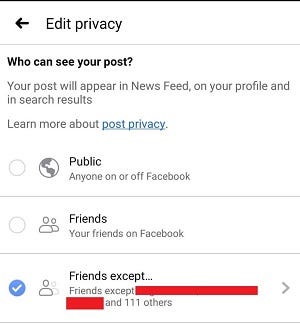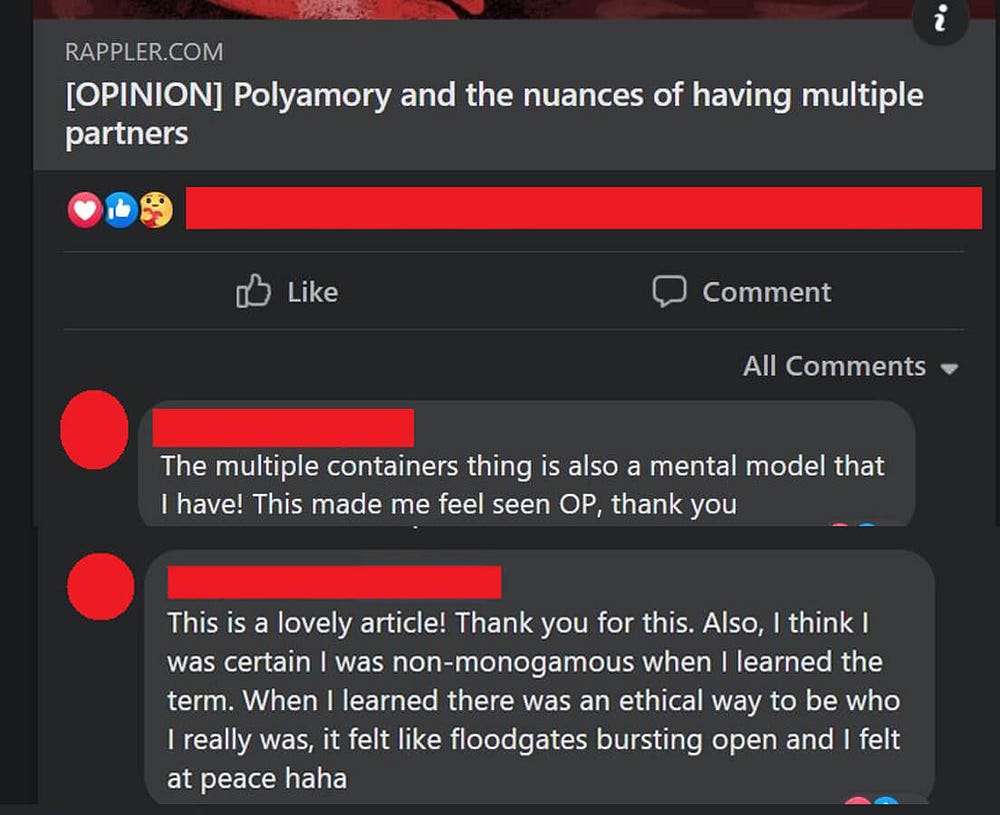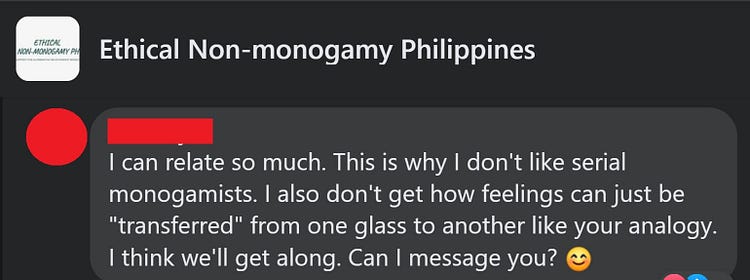Photo by Priscilla Du Preez on Unsplash
I’m part of an indigenous ethnic minority. I’m not a white guy or a rich Asian, and I’m polyamorous. I’ve had my fair share of being stereotyped, misunderstood, and judged. So I try to be respectful and less judgmental to others. Luckily, other people often do the same for me.
My search for Ethical Non-Monogamy communities in my country yielded little results. But when I joined the Facebook group for Ethical Non-Monogamy Philippines a few weeks ago, I was pleasantly surprised at how good it felt to be treated with respect.
When you want friendliness from strangers, you’ll likely get it from upscale café baristas or savvy bartenders hungry for a tip. Not much on social media. But the folks at the ENM FB group demonstrated an astonishing level of grace that made me feel welcomed, empathized, and connected.
Culture shock
I recently wrote about openly exploring polyamory for the first time. I haven’t been fully “out” with my (immediate & extended) family yet. So when I shared an opinion version of my story on social media, I had a lot of filters.

In fact, there were 113 people I hid the post from. I wasn’t ready to make them know about my relationship orientation yet. Weeks later, when I knew it wouldn’t show up on anyone’s newsfeed, I changed the privacy to “Public.”
I also shared my article on the ENM group feed. When people responded, I felt oddly culture-shocked.
For the first time, I was finally meeting people who understood and felt the same way as I did! There were plenty of comments and it’d be too long to place everything here, but this is a sample.

Another member said he really liked the glasses analogy in my article. He even shared how he uses fruits to illustrate his idea on having “enough” partners and navigating jealousy:
“I love grapes. I love apples. I love bananas. I love oranges. I get and enjoy different things from each, but I can enjoy them all equally.
If I had two partners, A and B, well, they’d both be special to me. And there is no “one over the other”, [because] partner A is the best at being partner A, and B is the best at being B.”
In the past, explaining how my feelings worked to other people felt like describing a color they haven’t seen or imagined. It was a refreshing feeling to see others who “get it.”

But what really caught my attention was the grace and respectfulness of the responses. Simple gestures like having ladies ask for my permission (“Can I message you?”) felt oddly good. Pre-pandemic, I was more accustomed to the bar and café pickup culture where “refined” manners are rare.
It was like crawling out of the Twitter sewers and jumping into an open, well-lit, civilized corner of social media that I never knew existed.
We’re told getting what you want requires not being nice
Dossie Easton and Janet Hardy talk about “building a culture of consent” in The Ethical Slut.
“Much of this conflict [on consent] is the consequence of our absurd cultural insistence that in sex, men should be the initiators and women the withholders.”
They explained that being in this environment teaches a set group of people to be pushy, to not take no for an answer, while others adopt a roundabout way of saying what they want because giving an outright yes would be considered “slutty.”
It’s an unnecessary game of push-and-pull that I see so much in toxic modern dating. Even outside the context of sex, I find the same message everywhere:
“It doesn’t pay to be nice.”
“Nice guys finish last.”
“Grab ’em by the pussy.”
“There’s only one rule in the jungle: When the lion’s hungry, he eats!”
(I actually like that last line from Guy Ritchie’s The Gentlemen. Cinematic flair).
Biopics about “great people’’ feature cheating brokers, ruthless politicians, or emotionally abusive geniuses. I bet the last headline you’ve read involved some asshole’s latest assholery.
Almost nobody talks about nice people. “Nice people are boring.” It’s an environment that glorifies prick-hood as a prerequisite for success.
The Gentlemen movie line above demonstrates how even I am inevitably drawn to this sentiment, despite my conscious resistance. And I’m not surprised if it’s the same for others.
It’s easier to be nice when you’re open
I spoke to one of the ENM Facebook group members recently. We swapped stories about how we started to know that we’re not monogamous. She said she’s never been bothered by the idea of her partner being intimate with others.
“What really bothers me is dishonesty and other actions that would make me look like a fool,” she told me in Filipino. “I’m happy when I see my partner being happy with other people… I just want to be kept in the loop.”
My current partner has the same sentiment. She said it’s liberating to see that the “excitement” for cheating, common to mainstream relationships, disappears in an Ethical Non-Monogamous setup.
ENM is not perfect of course. And it’s not something you can force on yourself or other people (like how it triggered the end of my 5-year relationship).
But even I feel that it’s “easier” to be more forthcoming with your feelings and be more accommodating of your partner/s when you’re in an ENM setup. If sex and intimacy are given freely and openly to other people, there is no need for manipulation, lying, false scarcity, and other not-nice things.
I’ve read some pieces on how jealousy in relationships isn’t real; that they’re mostly projections of personal insecurities/issues. I feel that I haven’t experienced enough to comment on that idea yet. But as my partner said;
“Sometimes, it takes a relationship for us to see the things we need to work on.”
Being mean is an old habit we need to disuse
Exploring polyamory and being immersed in the company of ethical non-monogamists taught me how to do away with the manipulative tactics I often see in traditional dating.
I think that’s what keeps us from becoming better people: Old habits we’ve adopted to cope with the judgments and consequences of repressive environments and beliefs.
And it’s difficult to change old habits.
The Ethical Slut authors say they wished “there’s a handy twelve-step group around the corner… or a class we could take…” when we want to teach others about adopting better behavior.
After all, kindness, respect, honesty, and understanding can’t be taught. They can only be experienced.
I’m lucky I experienced and learned them from other people. I’m reminded of them now by an ENM social media group. And my ENM relationship makes things easier to practice.
I was treated nicely, and it felt good. When we experience something good, we tend to share it. So I like to be nice and good to others whenever I can. Hopefully, maybe you would too.
